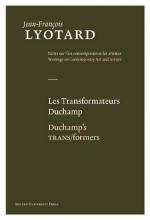|
This section contains 5,602 words (approx. 19 pages at 300 words per page) |

|
SOURCE: “A New Philosophical Interpretation of the Libido,” in Sub-Stance, Vol. VIII, No. 4, 1979, pp. 87-97.
In the following essay, Lingis describes the process of the libidinal economy as Lyotard conceives it to function in the individual.
Working with new concepts of impulsive intensity—libidinal space, libidinal time, libidinal identity, Jean-François Lyotard's Economie libidinale1 sets out to interpret in a coherent discourse the essential data of psychoanalysis, which had been formulated in a fragmented—physicalist, mechanist, hydraulic and mythical—language, or, in the phenomenological reworking, in mentalist, intentional, language. But Lyotard's book does not only devise a philosophically more coherent language for the findings of psychyanalysis; it also elaborates an interpretation of the data themselves. Assembling literary and theological texts along with certain Freudian texts given a new importance, Lyotard's book shows how theoretical activity and political economy reverberate with libidinal processes, and how the primary process libido...
|
This section contains 5,602 words (approx. 19 pages at 300 words per page) |

|


